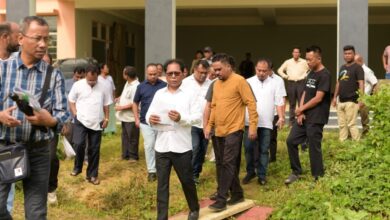
The memories of Meghalaya’s statehood movement are still fresh in his mind even at 88. He remembers his role as the last president of the All Party Hill Leaders’ Conference (APHLC). “I did not want to take up the responsibility but the senior leaders insisted that I should be the one,” said Milton Sangma, renowned historian, academician and author.
When Sunday Monitor met the octogenarian at his residence at Bonape in Tura’s Chandmari locality recently, he was surprised to see the guests. His wife Isabella D. Marak had already apprised the reporters of his hearing problem owing to old age. Though there were initial apprehensions about his health and whether he would be able to sit through the interview, Sangma proved otherwise.
“I am perfectly alright. I read regularly, including newspapers. The only problem is that I cannot write anymore as my arm pains,” said the former professor of NEHU who has authored over 20 books on Garo literature and history of the tribe.
Sangma, who was one of the pioneers of the Wangala Dance Festival, said his health does not permit him to attend any meeting on the festival in the past few years. “I do not even attend public functions, as nowadays, I feel jittery amid a crowd. I stay away from such meetings because I fear that I would fall sick,” he said as he strained his ears to listen to the questions.
As the conversation proceeded, Sangma leaned back on the chair. A hot cuppa made him comfortable.
Sangma asserted that the volume of Garo literature has increased over the years and the language is “definitely” eligible for a place in the 8th Schedule to the Constitution. The conversation started with the state’s race for the 8th Schedule status for Khasi and Garo languages.
According to Sangma, who has worked extensively on the history of Garo language and literature, the recognition to the language would encourage more youths to take it up as a major subject of study. “NEHU already has provision for MPhil and PhD in Garo language. In fact, the response has been good. Once recognised in the 8th Schedule, more youths will be interested in studying the subject. Having said that, we should not forget that more research needs to be done on the language,” he added.
When asked about his research on the language, Sangma’s face lit up. “Yes, I have written several books on Garo literature and the tribe’s history. I collected data from Kolkata, London, France etc. Give me a minute,” he said and left the room. He came in with a plastic bag after sometime.
“These are my books. There are over 20,” he opened the plastic bag and stacked the books on the sofa.
Sangma obtained his master’s degree from Calcutta University after which he joined Union Christian College in Barapani, and later the Department of History at NEHU, Shillong. Over the years, he has written several articles and journals, besides books on the Garo tribe.

Remembering the statehood movement, Sangma said he was never an active member of the movement but would participate in protests when he was a student. Later, he became the senior leaders’ pick for the presidentship of APHLC before it merged with other regional parties.
On supporting the cause for Garoland, the octogenarian paused for a few seconds. “I cannot support this openly. But there is a need for it. There are numerous problems and inconveniences in the current structure. For instance, for simple things, like change of name in an official document, one has to travel all the way to Shillong. Also, young scholars of NEHU have to go to Shillong to submit their theses as they do not trust the postal system. My granddaughter’s thesis took three months to reach NEHU Shillong,” he said, and reiterated, “There is a need.”
Sangma also believes that inner line permit will help preserve the integrity and identity of the state. In case of the inter-state boundary issue, he pointed out that when one of the criteria for deciding the borders is people’s consent, then “why isn’t the government giving importance to it?”.
“First, why is this government following the map drawn by the former government? There are about 10 lakh Garos in Assam who would like to be part of the Meghalaya state. Not considering them would be injustice to people,” he said.
In the autumn session of the Assembly held in September, Chief Minister Conrad Sangma had said the current government is going by the state’s map that was prepared by the previous government. He had also pointed out the difficulties in reworking the contours as it would be “complicated”. He reiterated that the state government was sincere in resolving the issue.
However, the academician has little faith in the existing political system that is “corrupt at all levels”. He said any set of rules and regulations or laws become banal if the leaders of the state are money-minded and find it difficult to remain honest.
“Money does not go where it has to. In the process, it’s the common people who suffer. It is the same at the district council level. It is sad that the leadership quality has gone down and everyone in the system has become money-minded,” he added.
The veteran historian’s frustration with the current state of affairs was palpable when he said the state “definitely needs a change (of guard)”, but “what’s the point? Elections come and go but nothing changes and so elections don’t excite me anymore”.
Sangma is upset about the way Meghalaya, which is celebrating 50 years of statehood this year, is being governed and how real development remains elusive after five decades. His reply to a question on the development of Tura could be a testimony to the government’s eyewash.
“Tura is growing haphazardly without proper planning. Now, the government is building concrete structures on footpaths in the name of beautification and pedestrians are struggling to navigate their way. Funds are coming, no doubt, but they are not being used meaningfully,” the despair sounded in his voice as he shook his head and leaned back on the chair after completing the sentence.
The state government is planning to suggest Sangma’s name for Padma Shri. When this was intimated to him, Sangma said with a smile, “Who will give me (the award)? I don’t have political contacts.”
Sangma was awarded the Tirot Sing Award but he could not collect it himself owing to his ailing health.
As the interview came to a conclusion, the veteran academician reiterated, “I am very upset about what is happening in the state. I have always been a critique (of the governance system). It will not change even if you write about it.”
~ Team Meghalaya Monitor from Tura
Related articles:
Garoland demand gets support of national body
NGO wants HNLC to include ILP, language & border on agenda for talks





